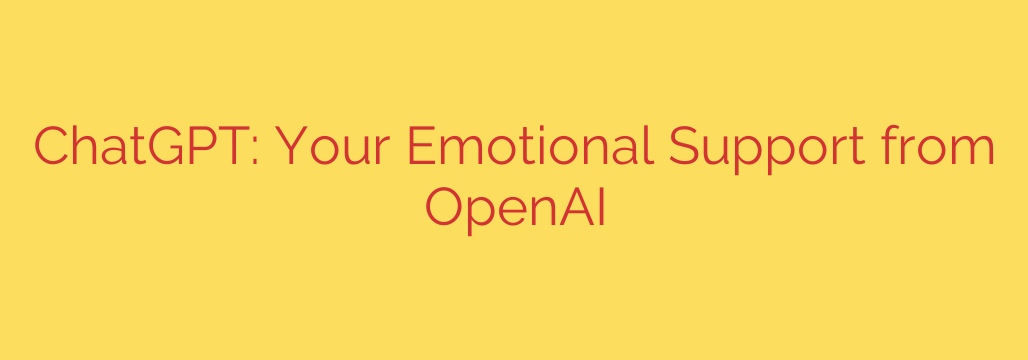
AI as a Confidant: The Pros and Cons of Using Chatbots for Mental Health
In an increasingly digital world, people are finding new ways to connect and seek support—and for many, that now includes artificial intelligence. The rise of sophisticated chatbots has opened a new frontier in mental wellness, with countless individuals turning to AI for a listening ear. But can a machine truly offer meaningful emotional support?
The answer is complex. While AI presents a fascinating and accessible tool, it’s crucial to understand both its powerful benefits and its significant limitations.
The Allure of an AI Companion
It’s no surprise that people are drawn to using AI for personal conversations. The reasons are compelling and address several challenges present in human relationships and traditional therapy.
- Unwavering Availability: An AI is accessible 24/7, instantly, and from anywhere. Whether you’re struggling with insomnia at 3 AM or need to vent during a stressful workday, the chatbot is always there without an appointment.
- A Judgment-Free Zone: One of the biggest draws is the complete lack of social judgment. Users can share their deepest fears, embarrassing thoughts, or controversial opinions without fear of criticism or gossip. This creates a unique space for unfiltered self-expression.
- Anonymity and Privacy: Discussing sensitive topics with an AI can feel safer than talking to a person. The perceived anonymity allows for a level of honesty that some might find difficult to achieve face-to-face, even with a therapist.
- Consistency and Patience: Unlike humans, an AI never gets tired, frustrated, or bored. It can address the same topic repeatedly with infinite patience, offering a stable and predictable interaction every time.
The Hidden Risks and What AI Can’t Replace
While the benefits are clear, leaning on AI for emotional support comes with critical drawbacks that must be acknowledged. Relying solely on a chatbot can be not only limiting but also potentially risky.
- The Absence of True Empathy: This is perhaps the most important limitation. An AI is designed to recognize and replicate patterns of empathetic language, but it does not possess genuine feelings, consciousness, or lived experience. It can tell you it understands, but it can never truly share in your humanity. Empathy is more than words; it’s a shared connection that a machine cannot fake.
- Serious Privacy and Data Concerns: The conversations you have with an AI are not private in the way a session with a therapist is. These interactions are often used as data to train the model further. Sharing highly sensitive, personally identifiable information is a significant risk. Your data could be exposed in a breach or used in ways you never intended.
- The Danger of Over-Reliance: Using an AI as a substitute for human connection can lead to social isolation. If you exclusively turn to a chatbot, you may miss opportunities to develop real-world coping skills and build meaningful relationships. Technology should supplement human connection, not replace it.
- Inability to Handle a Genuine Crisis: AI models are not equipped to manage severe mental health crises. They cannot assess risk, provide a diagnosis, or intervene in an emergency. For conditions like severe depression, suicidal thoughts, or psychosis, relying on an AI is dangerous and irresponsible.
How to Use AI for Mental Wellness Responsibly
If you choose to use AI as a tool for self-reflection, it’s vital to do so with caution and clear boundaries.
- Treat It as a Tool, Not a Therapist. Think of a chatbot as a sophisticated journaling prompt or a sounding board to organize your thoughts. It can be excellent for brainstorming solutions to low-stakes problems or practicing difficult conversations.
- Protect Your Personal Information. Be mindful of what you share. Avoid providing your full name, address, workplace, financial details, or specific information about others. Keep your conversations general to protect your privacy.
- Prioritize Human Connection. Make a conscious effort to nurture your relationships with friends, family, and community members. Real human interaction is essential for long-term mental and emotional health.
- Know When to Seek Professional Help. If you are struggling with persistent feelings of sadness, anxiety, or distress that interfere with your daily life, it is crucial to seek help from a licensed professional. An AI is not a substitute for qualified medical and psychological care.
Ultimately, AI chatbots are a remarkable technological achievement with the potential to serve as a helpful, supplementary tool for mental wellness. They can offer a convenient and non-judgmental space to explore everyday thoughts and feelings. However, they are no replacement for the nuanced understanding, genuine empathy, and professional expertise of a human therapist and the irreplaceable value of real human connection.
Source: https://www.bleepingcomputer.com/news/artificial-intelligence/openai-wants-chatgpt-to-be-your-emotional-support/








